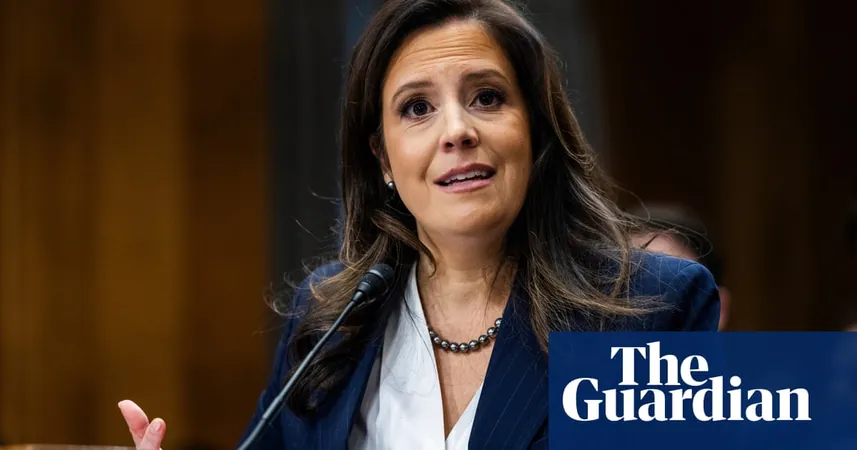
Trump’s UN Nominee Shakes Up Middle East Diplomacy with Bold Support for Biblical Claims to West Bank
2025-01-21
Author: Ken Lee
Trump’s UN Nominee Shakes Up Middle East Diplomacy with Bold Support for Biblical Claims to West Bank
In a move that could significantly alter the landscape of Middle Eastern diplomacy, Donald Trump’s nominee for US Ambassador to the United Nations, Republican Congresswoman Elise Stefanik, endorsed Israeli claims of biblical rights to the entire West Bank during her Senate confirmation hearing. This contentious endorsement aligns Stefanik with far-right Israeli leaders, a stance that raises concerns about its potential impact on diplomatic relations and peace efforts in the region.
During the confirmation hearing, Maryland Senator Chris Van Hollen grilled Stefanik on her views regarding Israeli sovereignty over the West Bank, a territory widely regarded as disputed under international law. “You told me that, yes, you shared that view,” he pointedly remarked. Stefanik confirmed, saying, “Yes,” illustrating her commitment to a controversial position that could distance the US from established international norms and complicate efforts to achieve a two-state solution.
The US pays a hefty $3.6 billion annually, accounting for about 22 percent of the UN's regular budget, making it the largest contributor to the organization. However, Stefanik’s views are in stark contrast to the longstanding international consensus, which includes numerous UN Security Council resolutions that oppose Israeli settlements in occupied territories. Critics, including Van Hollen, warn that Stefanik’s endorsement of biblical claims may severely damage the United States' credibility as a mediator, complicating peace negotiations that have been the foundation of American policy in the region for decades.
The timing of this revelation couldn’t be more critical; just hours before her hearing, Trump lifted US sanctions on far-right settler groups linked to violent incidents against Palestinians in the West Bank, coinciding with a significant Israeli military operation that reportedly resulted in at least nine deaths and numerous injuries among civilians.
Former ambassador to Israel, Mike Huckabee, has similarly expressed extreme views on the subject, once claiming, “there’s no such thing as a West Bank.” Such sentiments reflect a broader shift in American political discourse surrounding Israel, particularly among those aligned with Trump.
The US has long been Israel’s staunch ally at the UN, having vetoed 49 Security Council resolutions aimed at Israel since 1970, with five occurring just after October 7, 2023. This ongoing support culminates in escalating tensions between US and UN policies, particularly as the US has recently suspended funding to UNRWA, the agency aiding Palestinian refugees, amidst claims of staff involvement in the Hamas attacks.
Moreover, Stefanik has sharply criticized what she perceives as an anti-Israel bias within the UN, labeling it a “cesspool of antisemitism.” This rhetoric reflects her transformation from a moderate Republican to a solid defender of Trump’s policies, raising questions about her ability to navigate the complexities of international diplomacy.
If Stefanik is confirmed, her views may usher in a new era of US policy that exacerbates tensions in the already volatile Middle East. Critics are left asking: Will this shift away from international consensus lead to a further destabilization of the region, or can a fresh approach to US-Israeli relations set the stage for an unexpected path to peace? Only time will tell.




 Brasil (PT)
Brasil (PT)
 Canada (EN)
Canada (EN)
 Chile (ES)
Chile (ES)
 Česko (CS)
Česko (CS)
 대한민국 (KO)
대한민국 (KO)
 España (ES)
España (ES)
 France (FR)
France (FR)
 Hong Kong (EN)
Hong Kong (EN)
 Italia (IT)
Italia (IT)
 日本 (JA)
日本 (JA)
 Magyarország (HU)
Magyarország (HU)
 Norge (NO)
Norge (NO)
 Polska (PL)
Polska (PL)
 Schweiz (DE)
Schweiz (DE)
 Singapore (EN)
Singapore (EN)
 Sverige (SV)
Sverige (SV)
 Suomi (FI)
Suomi (FI)
 Türkiye (TR)
Türkiye (TR)
 الإمارات العربية المتحدة (AR)
الإمارات العربية المتحدة (AR)